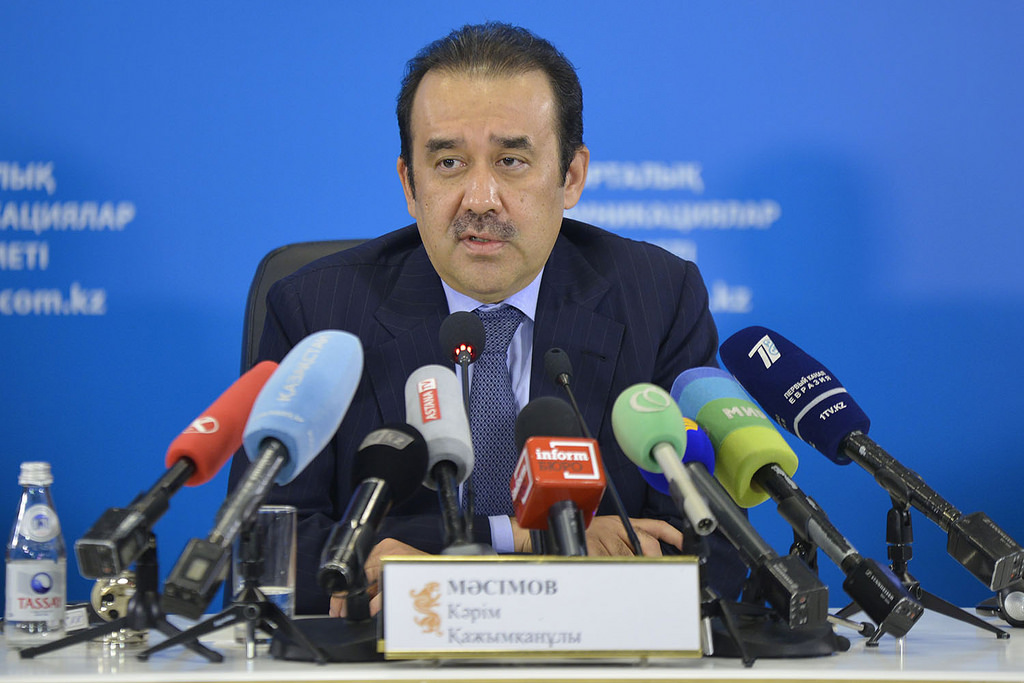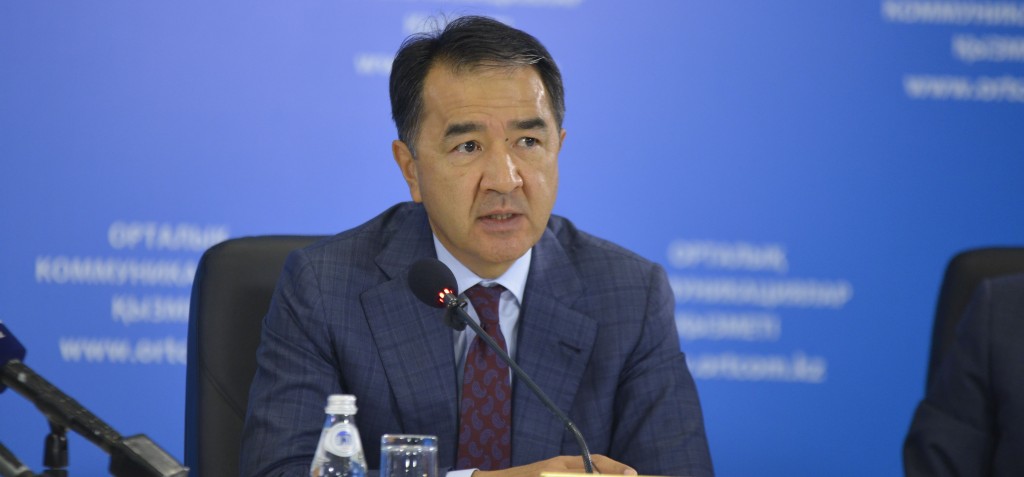ASTANA – Kazakhstan transitioned ahead of schedule to a free-floating exchange rate on Aug. 20 after the currency fell 5 percent against the dollar in commercial exchanges the day before.

Prime Minister Karim Massimov speaks at a Central Communications press briefing on Aug. 20, announcing the shift to a free-floating tenge exchange rate.
The move was announced in a two-hour press conference attended by the nation’s top finance and government officials, including Prime Minister Karim Massimov, First Deputy Prime Minister Bakhytzhan Sagintayev, Minister of National Economy Yerbolat Dossayev, Minister of Finance Bakhyt Sultanov, and National Bank Chairman Kairat Kelimbetov. As the announcement was made, the tenge dropped a further 20 percent and settled at 255.26 tenge per dollar, versus 188 to the dollar two days prior. The overall drop over two amounted to 26 percent.
Kelimbetov insisted the currency drop wasn’t a devaluation. “This is not a devaluation; this is a transition to a freely floating rate when the market itself determines a balanced exchange rate on the basis of supply and demand,” he said. An equilibrium will be found in five to seven days, he said, and appropriate next steps will be taken then.
Kelimbetov said the National Bank and the International Monetary Fund had been working together on the switch, which the bank chief said in June would happen over three to five years.
In the medium term, Kelimbetov said inflation is planned to be 8 percent, but will be brought down to 3-4 percent. Interest rates will be adjusted to achieve that, he said.
The shift to inflation targeting marks the end of the National Bank’s significant intervention into the exchange rate, though Kelimbetov noted that the bank “reserves the right to intervene when there is a threat to financial and price stability.” The rule that the difference between buying and selling dollars should not exceed two tenge still stands, and changes to the exchange rate will not be allowed on weekends or after 6 p.m., he said.
Major changes in the global economic situation led to the change, the officials said, particularly the economic woes of Kazakhstan’s major trading partners, Russia and China, and low prices for Kazakhstan’s oil and metal exports. Kelimbetov said he expects the dollar to continue to rise against other currencies.
The government will work to protect the prices of basic goods for a short time, the prime minister said. “Today, at the government meeting I [tasked the cabinet] to establish a special group to control the prices of basic goods in the nearest future to avoid the sudden rise in prices for such goods. We will prevent it. In a long term, I think goods need to have prices determined by the market. … The state must provide equal competitiveness so everyone would have an equal access to this market, and also the state needs to aid socially vulnerable people,” he said.
No new withdrawals from National Fund; no cuts to Nurly Zhol, social obligations
The country’s National Fund has more than $68 billion and the National Bank’s reserves stand at $29 billion, Kelimbetov said during the briefing.
There will not be any additional withdrawals from the National Fund, Massimov said in response to questions. “We will restrict ourselves to the withdrawals from the National Fund already agreed upon as of today. This is the equivalent of $8 billion for the current budget, plus $3 billion for the Nurly Zhol programme,” he said. He also said that the country would not be seeking loans from external markets.
It was stressed by all the officials that government social obligations will be met in full. This year’s budget is also to remain intact, said Sultanov. “The budget is ready for any possible changes in the market rate of the tenge,” he said.
However, the draft budget for the next three years will be cut, and, following the President’s instructions from the day before, almost no new projects are to be launched before 2018.
At an Aug. 19 government meeting, President Nursultan Nazarbayev said that Kazakhstan’s economic policies must “be ready for oil prices of $30-$40 per barrel,” as reported in this newspaper. Calculations for this year’s budget were based on oil prices at $50 per barrel, Dossayev said which is more or less within the actual price range so far this year. Next year’s budget will be based on $40 per barrel, Dossayev added.

First Deputy Prime Minister Bakhytzhan Sagintayev speaks at the Central Communications press briefing on Aug. 20 where the shift to a free-floating tenge exchange rate was announced.
He also emphasised that no cuts would be made to the Nurly Zhol programme. However, funds within the programme are to be redistributed to the most promising industries. He emphasised that a coming deal with China to cooperate on their new New Silk Road Economic Belt initiative and other transit projects across Kazakhstan would create opportunities for new growth.
Support for automakers, agriculture, oil
Oil production will not be cut, Sagintayev said. KazEnergy and the government have come up with a list of 39 low-profit oil companies that are to have their tax burdens reduced by 8 percent. The government is also considering a request by oil companies to increase associated gas flaring, which he said would increase production by 480,000 tonnes and bring an additional 19 billion tenge to the budget.
An additional 10 billion tenge (US$51 million) will be allocated to a car loans programme that supports Kazakh auto producers, he added, and subsidies for dairy, milk and egg producers will be increased by 50 percent by swapping out subsidies from less productive agricultural sectors.
Businesses to be responsible for being competitive
The need to become more competitive across the board was stressed repeatedly at the briefing. Massimov pointed out that the current global economic crisis isn’t universal. “In the new sectors of the economy that require new knowledge, a skilled workforce, which require more capacity and capabilities – in these sectors, there is no crisis,” he said. And since Russia began inflation targeting in November 2014, businesses in Kazakhstan had been asking for a more competitive currency rate, he said.
Now, businesses also have a responsibility to ensure that they are up to date technologically and methodologically.
“We can’t help every [small] business; we will only be able to help enterprises that are competitive,” Massimov said in response to a question about how the shift will affect small businesses. “Unfortunately, everyone is used having all problems solved by the government. We need to work under market terms in order to win in the market and [the state] needs to provide that competitiveness.”
Asked about reports predicting a Kazakh default, Massimov said, “If the government and the National Bank had done nothing … had not intervened, and instead had solved problems by burning through the National Fund, then yes, we could have defaulted.” Instead, he said the reserve was protected and ongoing structural reforms and cost-cutting will help Kazakhstan emerge stronger.
Russia switched to inflation targeting in November, and the value of Russian rouble versus dollar decreased more than two times since last year. China devalued its yuan over Aug. 11 – 13, followed by Vietnam, which devalued its dong on Aug. 19.

